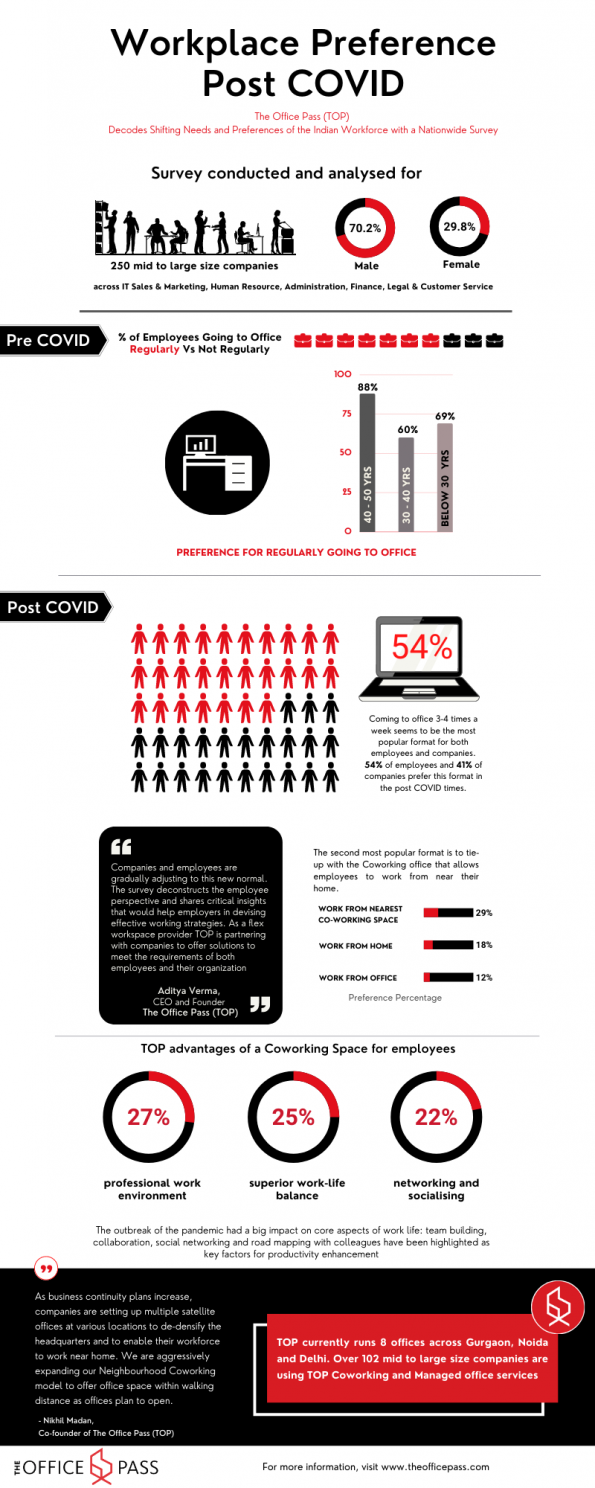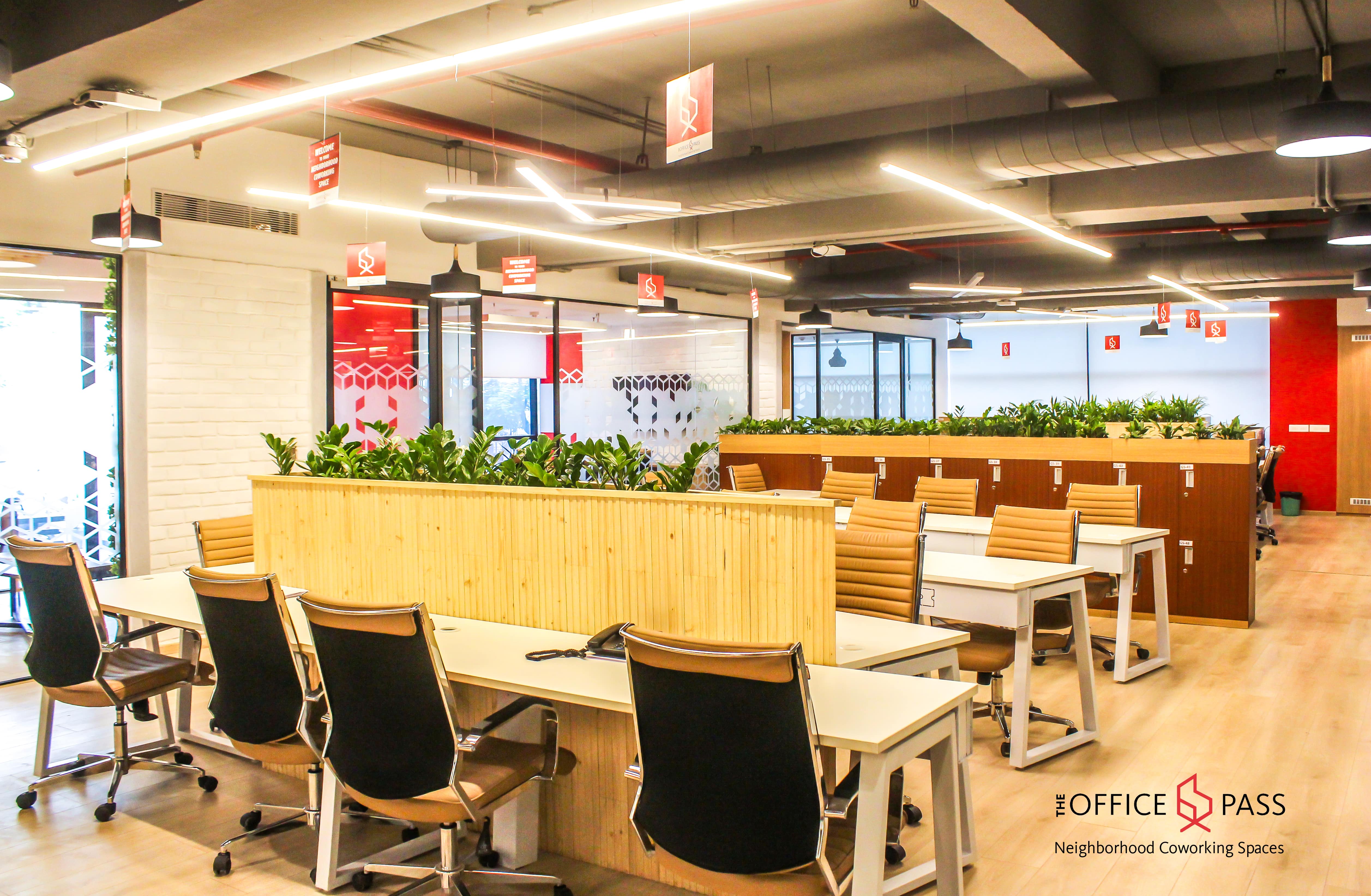New Delhi, 1st July, 2021: The Office Pass (TOP), one of the largest home-grown Neighbourhood Coworking space providers conducted a survey titled “Workplace preference post covid”, to provide an insight into the changing needs and preferences of the Indian workforce post the COVID-19 pandemic and the nationwide lockdown.
The ongoing pandemic has changed the way of work forever with companies altering their models and redefining work cultures by experimenting with work from home as well as work near home. Corporates across India continue to navigate the new normal by embracing digitization, and using a mix of remote work and work from home for uninterrupted functioning.
The survey, which was conducted among companies and their employees, brings to the forefront various challenges and opportunities employees have faced with this new mode of operation. Additionally, the survey focuses on employees’ willingness to work remotely from their homes as well as infrastructural requirements to aid them to operate effectively, amongst others.

“Companies and employees are gradually adjusting to this new normal. The survey deconstructs the employee perspective and shares critical insights that would help employers in devising effective working strategies. As a flex workspace provider TOP is partnering with companies to offer solutions to meet the requirements of both employees and their organization,” said Aditya Verma, CEO and Founder The Office Pass (TOP).
The survey was conducted over a period of 2 weeks across the metros in India, and analysed inputs from 250 mid to large size companies. The survey saw participation from 70.2% male & 29.8% females, across IT sales and marketing, Human Resource, Administration, Finance, Legal and Customer Service.
According to the findings, before Covid, 66% of all employees preferred going to the office regularly. Preference for regular office was more among senior people (40-50 years) with 80% wanting regular full-time office. This preference dropped to 60% and 69% in the age group of 30-40 years and < 30 years respectively. There were about 34% employees, even before Covid, who were not going to the office regularly. As per the survey, regular office work was more popular in larger organisations (71%) compared to small companies (56%) who were more flexible towards employee requirements.
“As business continuity plans increase, companies are setting up multiple satellite offices at various locations to de-densify the headquarters and to enable their workforce to work near home. We are aggressively expanding our Neighbourhood Coworking model to offer office space within walking distance as offices plan to open,” said Nikhil Madan, Co-founder of The Office Pass (TOP).
A year into the pandemic many new work formats have evolved and they are at various stages of experimentation. As per survey findings, the Indian workforce seems to be cautiously yet eagerly waiting to return to work. Coming to the office 3-4 times a week seems to be the most popular format for both employees and companies. 54% of employees and 41% of companies prefer this format in the post Covid times. The second most popular format is to tie up with the Coworking office that allows employees to work from near their home. This is preferred by 29% of companies. Permanent work from home (18%) and permanent return to full-time office (12%) are the least preferred options.
Distance of the office from home, also came up as a key factor for employees. Interestingly, 75% of employees prefer an office within 5 km from their home with another 21% who prefer less than 10 km. Post pandemic, very few prefer an office >10 km. This is on expected lines as people are afraid to travel in shared cabs or public transport like metro and busses.
The outbreak of the pandemic had a big impact on core aspects of work life: team building, collaboration, social networking and road mapping with colleagues have been highlighted as key factors for productivity enhancement. According to the survey, 27% of the employees prefer a “professional work environment” with another 25% mention “superior work-life balance” as the most important factor that enhances productivity. “Networking and socialising” ranked third with 22% of employees highlighting this as essential for productivity.
The second wave has brought several challenges and the hybrid work model is expected to dominate the world of work, for now. With the slow but sure reopening of offices, organisations will have to respond to these emerging demands, opportunities and challenges posed by the new normal with agility, to successfully sustain during these times.
About The Office Pass (TOP)
The Office Pass (TOP) is a technology driven Neighbourhood Coworking & Managed Office space provider in India. TOP is the only Coworking & Managed Spaces Company in India that promotes #Walk-to-Work. TOP’s vision is to have multiple Coworking offices spread across the city – so one can find the closest TOP office in less than 10 minutes.
TOP currently runs 8 offices across Gurgaon, Noida and Delhi. Over 102 mid to large size companies are using TOP Coworking and Managed office services. The company plans to open 100 Neighbourhood offices over the next 3 years with a presence in multiple cities across India.
To learn more, visit www.theofficepass.com and follow TOP on LinkedIN, Facebook and Twitter.



